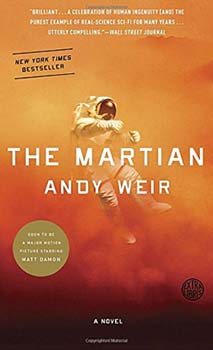 I think this is the first novel I’ve read with a movie on the horizon in 30 years. The last time I did this was Dune when I was in high school. (Mentally reviewing…so far, yes.) Had I known about the upcoming film starring a couple people from last year’s boring, disappointing Interstellar (Matt Damon, Jessica Chastain) I probably would’ve avoided the book. However, the podcast Inquiring Minds interviewed the author and my scientific curiosity was intrigued. Why? Weir made fantastic efforts to make the story accurate from the astronaut’s background (botany) to the Physics affecting the main spacecraft involved. Getting Sci-Fi legend Ridley Scott to direct was pure luck. Drew Goddard adapting the book into a screenplay will be crapshoot (Good: Daredevil for Netflix, Cabin in the Woods; Boring: Alias, Lost and World War Z).
I think this is the first novel I’ve read with a movie on the horizon in 30 years. The last time I did this was Dune when I was in high school. (Mentally reviewing…so far, yes.) Had I known about the upcoming film starring a couple people from last year’s boring, disappointing Interstellar (Matt Damon, Jessica Chastain) I probably would’ve avoided the book. However, the podcast Inquiring Minds interviewed the author and my scientific curiosity was intrigued. Why? Weir made fantastic efforts to make the story accurate from the astronaut’s background (botany) to the Physics affecting the main spacecraft involved. Getting Sci-Fi legend Ridley Scott to direct was pure luck. Drew Goddard adapting the book into a screenplay will be crapshoot (Good: Daredevil for Netflix, Cabin in the Woods; Boring: Alias, Lost and World War Z).
However, I’m focusing on the novel. The movie will be another kettle of fish, sadly The Guardian already saw it and said it runs out of gas.
The Martian begins after the third manned expedition of Mars is cut short by a violent dust storm. Mission Commander Lewis decided to abandon the landing site at NASA’s insistence which forced the crew to leave their temporary habitat (base) and bust-a-move to an escape rocket. Botanist Watney was hit by a large object so he was presumed killed as the remaining four astronauts returned to the main spacecraft orbiting Mars. Visibility was terrible. Besides, the odds were against Watney surviving such an object hitting him at the ridiculous velocity it did. Turns out everybody was wrong. He was knocked unconscious but whatever punctured his suit also kept it sealed.
After the storm has passed, Watney regains consciousness and makes it back to the landing base. Here he begins the process of trying to assess how long he can hold out because the next NASA mission is about three-to-four years away and a couple thousand kilometers elsewhere. The surprise here is that his long-term problem is starving to death. Water and air? In the near future it seems NASA has solved reclamation issues next to the astronauts dying from radiation. Now you can see why the author chose a botanist over Hollywood’s tradition of Col. Brock McFacepunch (Weir’s words in the interview, not mine).
The novel goes back and forth between Watney’s journal entries telling the audience what he’s doing to survive, what’s going on with the crew of the spaceship and what NASA is attempting once they discover Watney is alive. The latter two are told via the traditional third-person omniscient narrative. Watney’s journal entries are first-person diary things: blunt, rambling. This element grew tiresome for me. The Science was fantastic. How he makes a garden, recycles air/water, etc. By the two-thirds mark, it became similar to reading Holden Caufield on Mars and I couldn’t wait to the story to return to the other astronauts or NASA.
I do hope Andy Weir continues to write. I’m curious about what he plans to do next regardless of blogger Charlie Jane Anders’ drivel on io9.com (dear BBC, a blogger isn’t an author unless they have written an actual book). I just recommend he doesn’t do the first-person crap. Even heavy hitter James Ellroy couldn’t pull it off in White Jazz. Walter Mosley is an exception and John Swartzwelder utilizes it best to comedic effect.
For my fellow Science fan friends. I recommend reading this with the reservation over Watney’s journal. Everybody else, the movie will do just fine.
